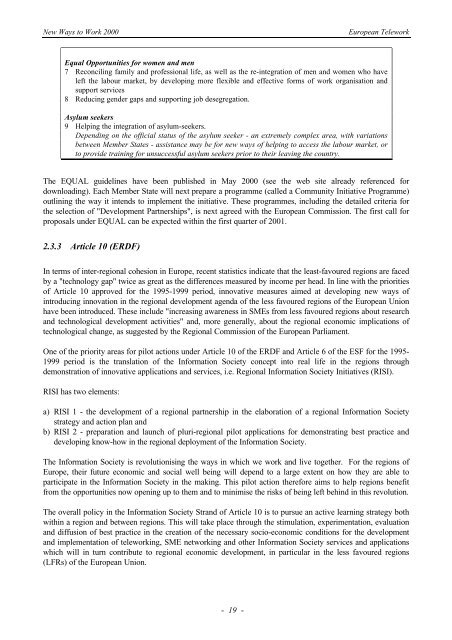eWORK 2000 - European Telework Week
eWORK 2000 - European Telework Week
eWORK 2000 - European Telework Week
- No tags were found...
Create successful ePaper yourself
Turn your PDF publications into a flip-book with our unique Google optimized e-Paper software.
New Ways to Work <strong>2000</strong><strong>European</strong> <strong>Telework</strong>Equal Opportunities for women and men7 Reconciling family and professional life, as well as the re-integration of men and women who haveleft the labour market, by developing more flexible and effective forms of work organisation andsupport services8 Reducing gender gaps and supporting job desegregation.Asylum seekers9 Helping the integration of asylum-seekers.Depending on the official status of the asylum seeker - an extremely complex area, with variationsbetween Member States - assistance may be for new ways of helping to access the labour market, orto provide training for unsuccessful asylum seekers prior to their leaving the country.The EQUAL guidelines have been published in May <strong>2000</strong> (see the web site already referenced fordownloading). Each Member State will next prepare a programme (called a Community Initiative Programme)outlining the way it intends to implement the initiative. These programmes, including the detailed criteria forthe selection of "Development Partnerships", is next agreed with the <strong>European</strong> Commission. The first call forproposals under EQUAL can be expected within the first quarter of 2001.2.3.3 Article 10 (ERDF)In terms of inter-regional cohesion in Europe, recent statistics indicate that the least-favoured regions are facedby a "technology gap" twice as great as the differences measured by income per head. In line with the prioritiesof Article 10 approved for the 1995-1999 period, innovative measures aimed at developing new ways ofintroducing innovation in the regional development agenda of the less favoured regions of the <strong>European</strong> Unionhave been introduced. These include "increasing awareness in SMEs from less favoured regions about researchand technological development activities" and, more generally, about the regional economic implications oftechnological change, as suggested by the Regional Commission of the <strong>European</strong> Parliament.One of the priority areas for pilot actions under Article 10 of the ERDF and Article 6 of the ESF for the 1995-1999 period is the translation of the Information Society concept into real life in the regions throughdemonstration of innovative applications and services, i.e. Regional Information Society Initiatives (RISI).RISI has two elements:a) RISI 1 - the development of a regional partnership in the elaboration of a regional Information Societystrategy and action plan andb) RISI 2 - preparation and launch of pluri-regional pilot applications for demonstrating best practice anddeveloping know-how in the regional deployment of the Information Society.The Information Society is revolutionising the ways in which we work and live together. For the regions ofEurope, their future economic and social well being will depend to a large extent on how they are able toparticipate in the Information Society in the making. This pilot action therefore aims to help regions benefitfrom the opportunities now opening up to them and to minimise the risks of being left behind in this revolution.The overall policy in the Information Society Strand of Article 10 is to pursue an active learning strategy bothwithin a region and between regions. This will take place through the stimulation, experimentation, evaluationand diffusion of best practice in the creation of the necessary socio-economic conditions for the developmentand implementation of teleworking, SME networking and other Information Society services and applicationswhich will in turn contribute to regional economic development, in particular in the less favoured regions(LFRs) of the <strong>European</strong> Union.- 19 -








